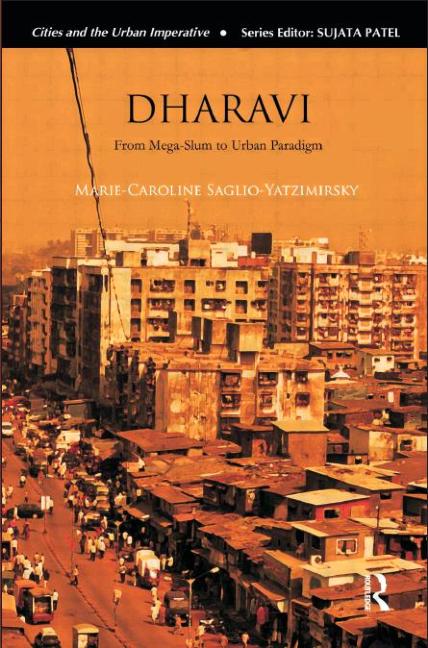Publications | Publications 2010 - 2013
Dharavi
From Mega-Slum to Urban Paradigm
Prix : £65.00
Located in the heart of Mumbai, Dharavi is estimated to be the largest slum in Asia. Often referred to as ‘Little India’, it has been home to thousands of migrants from across the country providing opportunities for work and livelihood. As such, Dharavi presents a fascinating paradox: the convergence of stereotypes associated with the slum — poverty and misery — and an effervescent economic vitality, impelled by globalisation and international capital flows.
Bringing together 20 years of painstaking fieldwork, this book reveals the social, economic, political, and urban complexities that define Dharavi beneath the shadow of Mumbai, the financial capital of India. It provides a rare account of the slum’s history, with a special focus on the original populace of leather workers — who form the backbone of its urban informal economy — their work, organisation and increasing political awareness. Dominated by a population of ex-‘untouchables’, conventionally stigmatised by poverty and low status, Dharavi illustrates how traditional caste-based occupational and regional divisions continue to be strong and affect structures of political governance and economy. At the same time, it testifies to an intimate encounter with consumerism, liberalisation and technological innovations, and its resultant cultural globalisation under the heady influence of media, advertising and cinema transmitted by the city of Mumbai.
This book traces the mega-slum’s gradual transformation as a thriving trade centre, through an informal economy’s successful adaptation to global markets, in turn establishing an urban paradigm. It will be useful to those in sociology, anthropology, urban studies, politics, public policy and governance, and to those interested in globalisation, transnational migration and town planning.
Les sites du CEIAS
- SAMAJ | The South Asia Multidisciplinary Academic Journal
- CEIAS - Facebook
- CEIAS - Twitter
- CEIAS - Newsletter
- Le Bulletin de la Bibliothèque
- Régionalisme & cosmopolitisme
- DELI | Dictionnaire Encyclopédique des Littératures de l’Inde
- DHARMA | The Domestication of “Hindu” Asceticism and the Religious Making of South and Southeast Asia
- TST | Texts Surrounding Texts
- STARS | Studies in Tamil Studio Archives and Society 1880-1980
- I-SHARE | The Indian Subcontinent’s Shared Sacred Sites
- Sri Lanka et diasporas
- Sindhi Studies Group
- Carnet du Master Études asiatiques
- Master “Asian Studies”
- Social Sciences Winter School in Pondicherry
- Caste, Land and Custom
- Musiques indiennes en terres créoles
 Actualités
Actualités
Devenir juifs : conversions et assertions identitaires en Inde et au Pakistan
 Débat - Mardi 9 mai 2023 - 14:00Présentation« L’an prochain à Jérusalem ! », scande un homme portant une kippa dans une synagogue de Karachi au Pakistan. Ses paroles sont répétées en chœur par les membres de sa communauté, un groupe comptant près de trois cents personnes qui s’autodésignent par (...)(...)
Débat - Mardi 9 mai 2023 - 14:00Présentation« L’an prochain à Jérusalem ! », scande un homme portant une kippa dans une synagogue de Karachi au Pakistan. Ses paroles sont répétées en chœur par les membres de sa communauté, un groupe comptant près de trois cents personnes qui s’autodésignent par (...)(...)
Le Centre d'études sud-asiatiques et himalayennes (Cesah), nouveau laboratoire de recherche (EHESS/CNRS) sur le Campus Condorcet
Échos de la recherche -Depuis le 1er janvier 2023, l'EHESS, en tant que co-tutelle, compte un nouveau centre de recherche né de la fusion du Centre d'études de l'Inde et de l'Asie du Sud (CEIAS - EHESS/CNRS) et du Centre d’études himalayennes (CEH - CNRS) : le Centre d'études sud-asiatiques et h (...)(...)
Centre d'Études de l'Inde et de l'Asie du Sud
UMR8564 - CNRS / EHESS
54 boulevard Raspail
75006 Paris, France
Tél. : +33 (0)1 49 54 83 94
Communication :
nadia.guerguadj[at]ehess.fr
Direction :
dir.ceias[at]ehess.fr
La bibliothèque du CEIAS
Maison de l'Asie
22 avenue du Président Wilson 75016 Paris
54 boulevard Raspail
purushartha[at]ehess.fr



